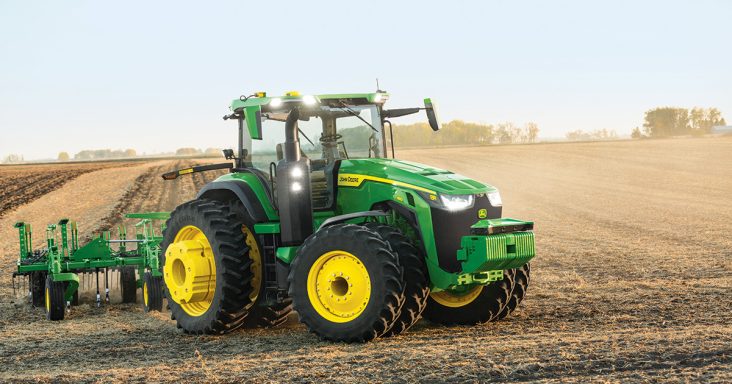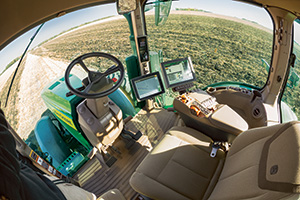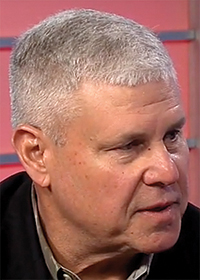Greenway Equipment boss discusses farm practices, ‘ever changing’ agriculture industry
by August 5, 2023 8:01 pm 1,250 views

When Greenway Equipment CEO Marshall Stewart began working for the company more than 25 years ago, the agriculture industry was very different. By far the biggest change has been the rampant development of farming equipment technology, he told Talk Business & Politics.
Stewart said the technological surge will continue into the coming decades as farms will have to become more efficient to feed an ever-growing global population. But some advances, such as the complete electrification of all farm equipment, may take longer than some might think.
Society is rapidly changing to all electric cars and other engines. General Motors has stated all of its vehicles will be electric by 2035, while Ford has said all of its vehicles will be electric by 2030. Banking and financial services company UBS Group has predicted that all vehicles sold globally will be electric by 2040.
Engines used in large farm equipment are a much different challenge, Stewart said. A few tractors and zero turn lawn mowers are electric, but the change to complete electrification will take many years, he said.
“I think what we are going to see for the foreseeable future is farm equipment powered by some type of diesel engine,” he said. “Now, electrification is coming to any engine under 100 horsepower. Right now, battery technology is not good enough for larger tractors and combines. The battery technology is going to have to change dramatically.”

“That day is coming, and it’s coming very soon,” he said.
In the immediate future, Stewart said he thinks this year’s crop is on pace to do well in the Delta. Farmers got the right mix of wet and dry days in the spring that allowed for early planting. And continued rains throughout late spring and early summer allowed producers to not have to irrigate as much as they did last summer when drought plagued the region.
Numbers from the U.S. Department of Agriculture support Stewart’s observations. The USDA’s National Agricultural Statistics Service (NASS) projects that about 1.31 million acres of rice has been planted in Arkansas in 2023. That’s nearly 200,000 acres more than were planted in 2022, according to the latest NASS report.
Arkansas soybean growers appear to be planting slightly fewer acres in 2023, with intended acreage falling 4% to just over 3 million acres. Nationally, acreage for the crop remains steady from 2022 at 87.5 million acres. Arkansas’ corn growers appear optimistic about the crop’s future, increasing acreage 14% to 810,000 acres.
One of Arkansas’ staple row crops has been down significantly this year, however. Cotton planted acres nationally are estimated at 11.1 million, down 19% from last year, NASS reported. Upland area is estimated at 11 million acres, down 19% from 2022. The American Pima area is estimated at 109,000 acres, down 40% from 2022.
In Arkansas, about 480,000 cotton acres have been planted, a drop of about 160,000 acres from last year. The Natural State ranks fourth in cotton production this year among all states, NASS reported.
Weather has always been an issue for farmers, but the geopolitical landscape has also had an impact in recent years, Stewart said. The ongoing invasion of Ukraine by Russia will impact grain and fertilizer markets for a second growing season.
Russia and Ukraine account for about 29% of global wheat trade and Russia is the world’s top wheat exporter. Ukraine accounts for about 16% of global corn exports. Much of the world’s fertilizers are produced in the region and prices nearly tripled last year when the conflict began.
Those prices have come back down, but Russia has targeted Ukraine’s export grain facilities on the Black Sea during the last two weeks. It’s unknown how the attacks will impact the country’s ability to export grains and it could lead to commodity price inflation as the harvest nears.

“No till” or “minimal till” practices are among the actual operational changes that are taking place on many farms, Stewart said. Producers are engaged in several practices to reduce a farm’s carbon footprint, he said.
“Farm practices continue to evolve. Producers try to be as efficient as possible,” he said. “Whether it’s no-till or minimal till or water management or nutrient management, most of our producers are trying to feed the world and remain profitable at the same time. Most are good stewards of the land.”
Stewart, whose company operates 32 stores in Arkansas and southern Missouri, said shifts on the farm have been constant during the past quarter century. There’s one thing he is certain about. Those changes won’t soon stop.
“Agriculture is ever-changing. Farming is not like it used to be,” he said.
